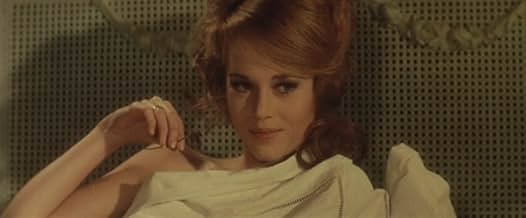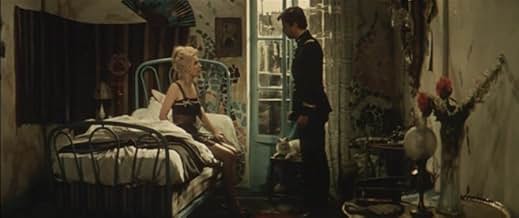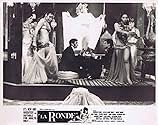PUNTUACIÓN EN IMDb
5,5/10
672
TU PUNTUACIÓN
En París, durante el verano de 1914, una serie de relaciones comienza y termina con un soldado y una tarta.En París, durante el verano de 1914, una serie de relaciones comienza y termina con un soldado y una tarta.En París, durante el verano de 1914, una serie de relaciones comienza y termina con un soldado y una tarta.
- Premios
- 1 nominación en total
Jean-Claude Brialy
- Alfred
- (as Jean Claude Brialy)
Francine Bergé
- Maximilienne de Poussy
- (as Francine Berge)
Bernard Noël
- L'auteur
- (as Bernard Noel)
Jean Parédès
- M. Albert
- (as Jean Paredes)
Argumento
¿Sabías que...?
- CuriosidadesRoger Vadim had a massive eight-story billboard put up on the side of the De Mille Theater in New York City to promote the movie premiere. It featured a nude Jane Fonda laying on a bed with her bare butt visible. Fonda had no knowledge he was going to do it and was shocked when she saw her naked body towering above the city. Her father, actor Henry Fonda, was furious.
- ConexionesReferenced in What's My Line?: Johnny Mercer & Jane Fonda (1964)
Reseña destacada
If nothing else, Vadim had plenty of brass neck and he needs it all here in remaking one of the great classics by one of the greatest of all directors, Max Ophüls.
With some inevitability the Vadim film really only serves to point up how wonderful the Ophüls film is. Vadim and Ophüls are of course chalk and cheese. The latter was the great genuine master of the ellipsis (as opposed to Lubitsch who faked it) and could make something elegant out of the most sordid realities; Vadim on the other hand could have made a concert of baroque music seem vulgar and rendered a vicarage tea-party pornographic.
Schnitzler's play, controversial when it appeared, is cynical and sordid in many ways (and quite intentionally so) but in the hands of Ophüls it becomes something of remarkable beauty without any loss of its satirical effect. Both in structure (the reflexive frame with an Anton Walbrook on the top of his form directing the symbolic roundabout - the original sense of the play's title - Der Reigen)and in substance (even at their most debased, his lovers have a certain innocence and a certain charm), the 1950 film delights at every turn. The 1964 film makes one feel a bit queasy, as Vadim transforms Schnitzeler's material into something resembling primeval slime.
The contrast I expected but I did not imagine it would be quite so marked and it is almost shocking to observe how the same material can produce such vastly different results and induce such vastly different reactions.
This is not to decry Vadim whose importance during these years is undeniable and who, in his better films, pushed forward the barriers of what could be said and shown in films in important ways and whose work, although always a shade dubious (that inescapable vulgarity) has often survived better than one might have supposed. Et Dieu créa la femme, the film that made his (and Bardot's) name and gave him the license for everything he did later, still has a zest and energy that is breath-taking, Barbarella, which I once thought would simply appear silly in years to come, surprises me every time I watch it by how enjoyable it remains and how excellent some of the ideas still appear.
Vulgarity where it is combined with a real sense of fun is, to my mind, always excusable and sometimes a real if slightly guilty pleasure. One might think of Lubitsch, of early DeMille, of Dino Risi, of spaghetti westerns and gialli.... but this, on the other hand is quite simply a film that should never have made, one for which Vadim's special but strictly limited talent was insufficient qualification.
After the lame 1941 remake of Dr. Jekyll and Mr. Hyde, Fredric March, who had starred in the superb Mamoulian version of 1931, supposedly telegraphed Spencer Tracy (star of the duff version) to thank him for having so greatly (but unintentionally) enhanced his (March's) reputation as an actor. Had Ophüls still been alive in 1964, he could (and probably would) have thanked Vadim in much the same spirit.
With some inevitability the Vadim film really only serves to point up how wonderful the Ophüls film is. Vadim and Ophüls are of course chalk and cheese. The latter was the great genuine master of the ellipsis (as opposed to Lubitsch who faked it) and could make something elegant out of the most sordid realities; Vadim on the other hand could have made a concert of baroque music seem vulgar and rendered a vicarage tea-party pornographic.
Schnitzler's play, controversial when it appeared, is cynical and sordid in many ways (and quite intentionally so) but in the hands of Ophüls it becomes something of remarkable beauty without any loss of its satirical effect. Both in structure (the reflexive frame with an Anton Walbrook on the top of his form directing the symbolic roundabout - the original sense of the play's title - Der Reigen)and in substance (even at their most debased, his lovers have a certain innocence and a certain charm), the 1950 film delights at every turn. The 1964 film makes one feel a bit queasy, as Vadim transforms Schnitzeler's material into something resembling primeval slime.
The contrast I expected but I did not imagine it would be quite so marked and it is almost shocking to observe how the same material can produce such vastly different results and induce such vastly different reactions.
This is not to decry Vadim whose importance during these years is undeniable and who, in his better films, pushed forward the barriers of what could be said and shown in films in important ways and whose work, although always a shade dubious (that inescapable vulgarity) has often survived better than one might have supposed. Et Dieu créa la femme, the film that made his (and Bardot's) name and gave him the license for everything he did later, still has a zest and energy that is breath-taking, Barbarella, which I once thought would simply appear silly in years to come, surprises me every time I watch it by how enjoyable it remains and how excellent some of the ideas still appear.
Vulgarity where it is combined with a real sense of fun is, to my mind, always excusable and sometimes a real if slightly guilty pleasure. One might think of Lubitsch, of early DeMille, of Dino Risi, of spaghetti westerns and gialli.... but this, on the other hand is quite simply a film that should never have made, one for which Vadim's special but strictly limited talent was insufficient qualification.
After the lame 1941 remake of Dr. Jekyll and Mr. Hyde, Fredric March, who had starred in the superb Mamoulian version of 1931, supposedly telegraphed Spencer Tracy (star of the duff version) to thank him for having so greatly (but unintentionally) enhanced his (March's) reputation as an actor. Had Ophüls still been alive in 1964, he could (and probably would) have thanked Vadim in much the same spirit.
- kekseksa
- 12 nov 2017
- Enlace permanente
Selecciones populares
Inicia sesión para calificar y añadir a tu lista para recibir recomendaciones personalizadas
- How long is Circle of Love?Con tecnología de Alexa
Detalles
- Fecha de lanzamiento
- Países de origen
- Sitio oficial
- Idioma
- Títulos en diferentes países
- La Ronda del Placer (2020)
- Empresas productoras
- Ver más compañías en los créditos en IMDbPro
- Duración1 hora 50 minutos
- Mezcla de sonido
- Relación de aspecto
- 2.35 : 1
Contribuir a esta página
Sugerir un cambio o añadir el contenido que falta

Principal laguna de datos
By what name was Juegos de amor a la francesa (1964) officially released in Canada in English?
Responde




























